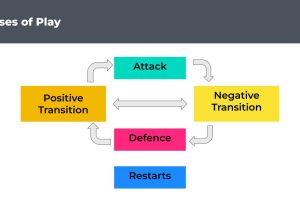The Importance of Communication in Soccer Coaching: Enhancing Team Performance
Communication is a fundamental aspect of soccer coaching that can significantly affect the performance of players on the field. Effective communication between coaches and players can help to build trust, enhance team cohesion, and improve overall performance.
Physical communication is an essential aspect of coaching, especially when coaching younger players. Young children learn better by doing and feeling the correct pattern or shape of the movement than by listening. Therefore, coaches must guide players’ limbs through the correct movement to help them learn new skills effectively.
Moreover, communication is crucial during soccer games. Players need to communicate with each other on the field to coordinate their movements and make quick decisions. Coaches must also communicate with players during the game to give instructions, offer feedback, and make necessary adjustments to the team’s strategy. Effective communication during games can help players stay focused, motivated, and organized, leading to better performance and results.
The Basics of Communication in Soccer Coaching
Verbal Communication
As a soccer coach, I understand that verbal communication is essential in getting my players to work together and achieve their goals. In soccer, verbal communication involves giving instructions, calling out plays, and providing feedback to players during the game. It is important to use clear and concise language when communicating with players, as well as using positive reinforcement to encourage good behavior and performance.
One effective way to improve verbal communication in soccer coaching is to establish a set of standard phrases or words that can be used by players during the game. For example, a coach can use the word “switch” to indicate that the ball should be passed to the other side of the field. This helps players communicate more efficiently and effectively during the game.
Non-Verbal Communication
Non-verbal communication is also an important aspect of soccer coaching. This includes using body language to convey messages to players. I use non-verbal cues to indicate when a player needs to make a run or when they need to change their position on the field. This can be done through hand gestures or simply by making eye contact with the player.
Another important aspect of non-verbal communication in soccer coaching is the use of visual aids. This can include using diagrams or videos to demonstrate plays or strategies to players. This helps players visualize the play and understand their role in it.
In conclusion, effective communication is essential in soccer coaching. Verbal communication involves giving clear and concise instructions, using positive reinforcement, and establishing standard phrases or words. Non-verbal communication involves using body language, visual aids, and other cues to convey messages to players. I strive to use both verbal and non-verbal communication to help my players succeed on the field.
The Role of Communication in Building Team Dynamics
Effective communication helps establish trust, creates a positive environment, and ultimately leads to better team performance.
Establishing Trust
Trust is a fundamental aspect of any successful team, and it begins with communication. I make sure to communicate openly and honestly with my players. This means providing feedback, both positive and negative, and actively listening to their concerns and ideas. By doing so, I am able to build a relationship of trust with my players, which translates into better team dynamics on and off the field.
Creating a Positive Environment
Creating a positive environment is another critical aspect of effective communication in soccer coaching. As a coach, I strive to create an environment that is supportive, encouraging, and respectful. I make sure to communicate with my players in a way that promotes positivity and reinforces their strengths. This helps to build confidence and motivation, which leads to better performance on the field.
Additionally, I encourage my players to communicate with each other in a positive and respectful manner. This means promoting teamwork, collaboration, and constructive feedback. By creating a positive environment where communication is open and respectful, I am able to build a team that is cohesive and effective.
Overall, effective communication is essential to building team dynamics in soccer coaching. By establishing trust and creating a positive environment, coaches can foster better communication among their players, leading to better team performance on the field.
Effective Communication Strategies for Soccer Coaches
Active Listening
Active listening is a key communication strategy that involves paying attention to what the other person is saying and demonstrating that you understand their point of view. When I actively listen to my players, I make eye contact, nod my head, and ask clarifying questions to ensure that I understand their perspective. By doing so, I build trust with my players and create a safe space for them to express their thoughts and feelings.
Providing Constructive Feedback
Another effective communication strategy that I use as a soccer coach is providing constructive feedback. When I give feedback to my players, I focus on specific behaviors or actions that they can improve, rather than criticizing them as individuals. I also use the sandwich method, which involves starting with a positive comment, providing constructive criticism, and ending with another positive comment. This approach helps my players feel motivated to improve and valued as individuals.
Using Clear and Concise Language
Finally, I make sure to use clear and concise language when communicating with my players. I avoid using technical jargon or complex language that may confuse my players. Instead, I use simple and direct language that is easy to understand. I also use visual aids, such as diagrams and videos, to help my players better understand the concepts that I am teaching. By using clear and concise language, I ensure that my players are able to understand and implement my instructions effectively.
The Importance of Communication in Game Strategy
It is essential to have a clear game plan before the match, and it is equally important to make in-game adjustments to ensure success. Here are two sub-sections that highlight the significance of communication in game strategy:
Developing a Game Plan
Before every match, I make sure to communicate with my team to develop a game plan. It is important to discuss the strengths and weaknesses of the opposing team and to come up with a strategy that will help us win. This involves discussing the formation we will use, which players will be in which positions, and what our overall game plan will be.
By communicating with my team, we are able to work together to create a game plan that everyone understands and can execute. This helps to ensure that we are all on the same page and working towards the same goal.
In-Game Adjustments
During the game, it is important to be able to make adjustments based on what is happening on the field. This requires clear communication between the coach and the players. For example, if we are struggling to score goals, I may decide to change our formation or bring in a different player to try and create more chances.
It is also important for players to communicate with each other during the game. For example, if a defender notices that the opposing team is consistently making runs down the wing, they can communicate this to their teammates so that they can adjust their positioning and prevent the other team from scoring.
By being able to make in-game adjustments and communicate effectively with each other, we are able to increase our chances of success on the field.
Conclusion
Effective communication can make the difference between a win and a loss. It is essential to communicate with your team before, during, and after the game to ensure that everyone is on the same page.
During the game, it is crucial to communicate with your players to provide feedback, instructions, and encouragement. This can help players stay focused and motivated, which can lead to better performance on the field.
One of the most important aspects of communication is listening. As a coach, it is essential to listen to your players and respond to their concerns and feedback. This can help build trust and respect between you and your team, which can lead to a more positive and productive environment.
Overall, effective communication is essential in soccer coaching. It can help improve team performance, build relationships, and create a positive and supportive environment. By prioritizing communication, coaches can help their players reach their full potential and achieve their goals on the field.








